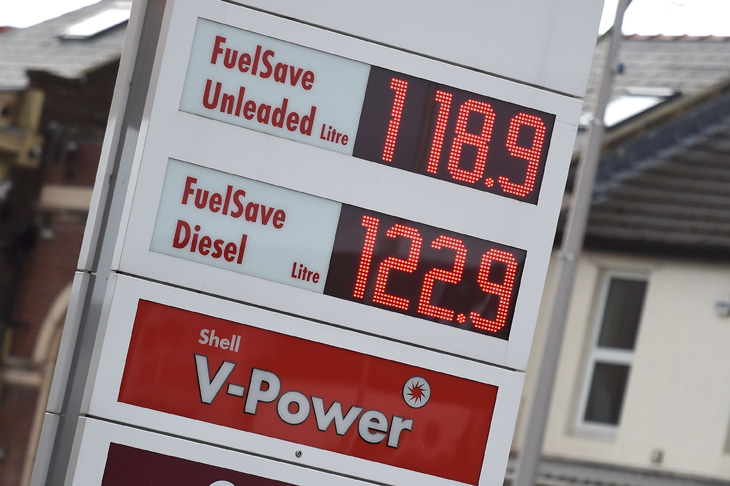Is capping domestic energy prices an equitable way to help the ‘just about managing’, or an electoral gimmick with a whiff of anti-free-market ideology? When it was Ed Miliband’s idea, it was certainly the latter. Now it’s likely to be included in Theresa May’s manifesto, offering a potential £100 saving for millions of homes on ‘standard variable tariffs’, it is defended by the ever-plausible Sir Michael Fallon as a matter of ‘intervening to make markets work better’. And that, after all, is what the Prime Minister said she would do, wherever necessary, in the interests of fairness.
In a regulated market, within which the consumer’s ability to choose the most favourable tariff or supplier is notoriously obscured by complex competing offers, an intervention to help inflation-hit householders is hardly a serious assault on capitalism, even if it hurts the shareholders and even dents the executive bonuses of suppliers such as Centrica and SSE. Well maybe, but it is still a dangerous precedent created by an easy promise, and Centrica chief executive Iain Conn was justified in reacting like a scalded cat.
The underlying risk is that prices will go on rising above inflation year after year, because successive governments go on failing to secure future power supplies, instead relying on imports at fluctuating exchange rates. In consequence, ever bigger price interventions will be called for, making the industry less profitable and less willing to invest in new capacity. To avoid that vicious circle, the Tories — given their apparent winning hand — should drop the price-cap vote-grabber and promise instead a serious long-term energy strategy.
Killer heels
I don’t know the difference between killer heels and kitten heels, but I’ll bet Theresa May owns several pairs of Jimmy Choos. Does that make this an auspicious moment for a new buyer of the designer brand — or do tougher times ahead mean Choo’s current owners are wise to exit? Either way, a market value of £700 million looks rich for the listed Jimmy Choo plc, its shares having risen 80 per cent since last June, so it’s no surprise German investment group JAB is aiming to offload its 68 per cent holding.
The rest of JAB’s portfolio consists of popular coffee and donut brands, Belstaff outerwear for motorcyclists and a stake in Reckitt Benkiser, which makes useful products such as Durex, Gaviscon and Harpic. Those are the kind of solid, long-term bets that Warren Buffett might favour, whereas a purveyor of wear-them-once £1,000 stilettos might be (like the wearer, as it were) a private-equity plaything for a while, but is bound to fade. So I won’t be launching a bid.
The real Macron
Stock markets staged a ‘relief rally’ in response to the rise of Emmanuel Macron as clear favourite for the French presidency; the MSCI World Index, a measure of global share prices, hit an all-time high, while the euro traded stronger. But celebrations must have been muted in my Dordogne holiday village of St Pompon, which I claimed last week as the perfect election indicator. My neighbours may swing behind Macron in the second round, but in the first they gave him just 45 votes, behind Marine Le Pen (61), Jean-Luc Mélenchon (59) and François Fillon (47), while the Dordogne as a whole put the Trotskyite Mélenchon on top.
That’s a disturbing indicator of true sentiment in la France profonde, but perhaps more pertinent for this column is to know how French expatriates voted in London and New York. Mostly young, well educated and in good jobs or entrepreneurial ventures, almost 100,000 registered on each side of the pond — and reportedly went big for Macron. Why? My Gallic stringer texts from Manhattan: because he’s ‘the perfect bullshitter’, claiming he’s the entrepreneurs’ friend and ‘riding the Justin Trudeau wave’ of youthful glamour. But ‘at heart he’s a socialist opportunist’, so prenez garde.
Northern powerbase
The other election that catches my business eye is the one for mayor of Greater Manchester. The winner will have a powerbase with huge potential: a city-region of 2.7 million people, an enterprise culture that has evolved over two centuries, an outstanding university science base, strong flows of inward investment, Europe’s largest industrial estate at Trafford Park, a global sports brand at Old Trafford, and a world-class airport. Yes, it also has problems of ‘entrenched worklessness’, NHS overstretch and underperforming schools — and nine of its ten local authorities are Labour-controlled. But that’s no reason to award the mayor’s job to yet another socialist opportunist.
I refer of course to Liverpool-born two-time leadership loser Andy Burnham, who is standing down as an MP in the expectation of mayoral victory on 4 May. Who am I to argue with the New Statesman when it says Burnham is ‘widely seen as an unprincipled flip-flopper’; but what’s more important is that he can claim no working relationship with Theresa May, has only lately paid lip- service to city-region devolution and the Northern Powerhouse, and has never in his life had anything to do with enterprise.
Now that George Osborne has gone, the Manchester-centred Powerhouse needs a new champion who is trusted by local business leaders and has access to Downing Street. Burnham is more likely to be left sulking in his fastness, particularly if the Tories win the West Midlands mayoralty (where their candidate is former John Lewis boss Andy Street) and shower it with investment as a reward.
Manchester’s Conservative candidate Sean Anstee (council leader in the conurbation’s sole Tory borough, Trafford) is already a respected and well-networked player in the devolution project. The odds are against him but they ought to be narrowing: voters would be wise to pick mayors who favour prosperity and connect to power, not carpetbagging has-beens.
Got something to add? Join the discussion and comment below.
Get 10 issues for just $10
Subscribe to The Spectator Australia today for the next 10 magazine issues, plus full online access, for just $10.
You might disagree with half of it, but you’ll enjoy reading all of it. Try your first month for free, then just $2 a week for the remainder of your first year.















Comments
Don't miss out
Join the conversation with other Spectator Australia readers. Subscribe to leave a comment.
SUBSCRIBEAlready a subscriber? Log in